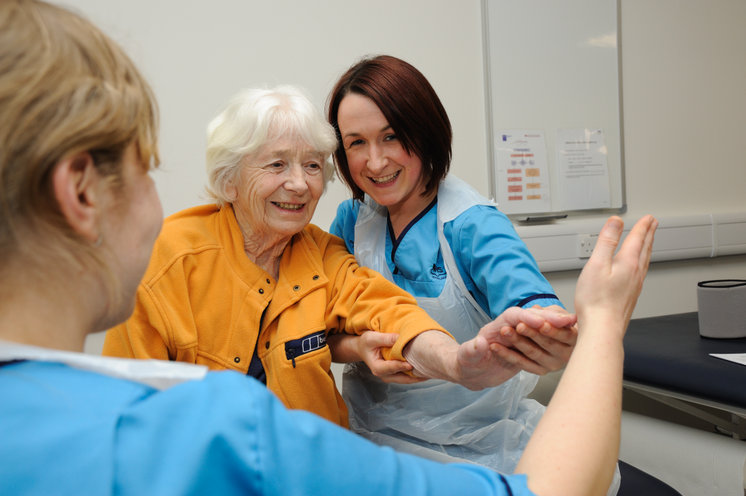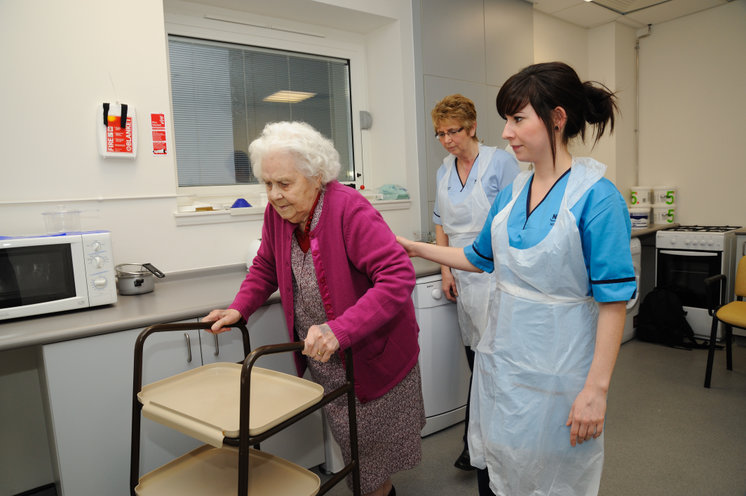
Occupational Therapy Acute Physical Care
Occupational Therapy – Acute Physical Care
Information leaflets – post-viral fatigue
The Royal College of Occupational Therapists have developed a collection of information leaflets that contain practical advice to support people to manage symptoms of fatigue after COVID.
- How to manage post-viral fatigue after COVID-19 Practical advice for people who have recovered at home
- How to manage post-viral fatigue after COVID-19 Practical advice for people who have been treated in hospital
- How to conserve your energy Practical advice for people during and after having COVID-19
On this page
Related Content
Useful Links
Occupational therapy provides practical support to empower people to facilitate recovery and overcome barriers preventing them from doing the activities (or occupations) that matter to them. This support increases people’s independence and satisfaction in all aspects of life.
“Occupation” as a term refers to practical and purposeful activities that allow people to live independently and have a sense of identity. This could be essential day-to-day tasks such as self-care, work or leisure.
An occupational therapist will consider all of the patient’s needs – physical, psychological, social and environmental. This support can make a real difference giving people a renewed sense of purpose, opening up new horizons, and changing the way they feel about the future. (RCOT 2019)
When occupational therapists work with people with disabilities they focus on:
- Enabling clients to function at an optimal level, despite barriers
- How activities which the person needs or wants to do can be modified or adapted to make them easier
- How clients feel about themselves and their ability to tackle problems
- How the physical and social environment can be altered so that restrictions are reduced

Within NHS Lanarkshire, there are Occupational Therapy Departments in all 3 acute hospitals: University Hospital Hairmyres, University Hospital Monklands and University Hospital Wishaw. Each department provides an in-patient service to the following areas:
- Medical
- Surgical
- Orthopaedics – elective and trauma
- Elderly care
- Acute stroke
- Emergency departments/ receiving units
Lanarkshire wide centralised services including renal services, dermatology, haematology, ENT, urology, vascular and infectious diseases.
The service also operates out-patient occupational therapy services for:
- hand injury clinic for patients with complex conditions, or requiring specialist intervention following elective surgery/ trauma
- rheumatology
- renal
- Orthopaedic elective surgery (Pre-surgery joint school)
Pathways within the acute hospital
The current pathways within the acute hospital settings can support people in a number of different ways, which have been detailed below.
For referrals to this service:
- In-patients: Referral to the in-patient acute Occupational Therapy service can be made by any member of the multidisciplinary team.
- Out-patients: Please click on the link for Rheumatology or Hand Therapy for further details of the services available and ways to refer.
Recover from acute illness
Such as depression, anxiety, acute admission to hospital following stroke, surgery, falls, respiratory conditions, infection/sepsis or cardiac events. Occupational therapists have a key role in the prevention of avoidable admission to hospital, and where hospital admission is necessary, they are focused in supporting a reduced length of stay and timely co-ordinated discharge.
Manage long term conditions
People with a long term condition or multiple co-morbidities may benefit from rehabilitation and re-ablement interventions at different stages of their condition to help them regain or maximise their independence and reduce unnecessary dependency on statutory services.
Self manage conditions
People can be provided with appropriate information and early advice to make informed choices and enable them to manage their own health, helping them to reduce the risk of developing secondary problems affecting physical or mental health, and impacting on their abilities to engage in their communities. For example preventing the loss of muscle strength and cardiovascular fitness, preventing social isolation, reducing obesity, increasing confidence and reducing anxiety/depression, reducing pain, fatigue and joint deformity.
Emergency care intervention
Where admission to hospital can be avoided from the emergency department or receiving units, the occupational therapists can support with immediate planning for how you will manage activities of daily living on return home. They often signpost to resources including online information or voluntary services who can help you to self manage conditions and live well at home. In the event that more specialist assessment would be required for your return home, the occupational therapists in these areas work very closely with community teams and can arrange for community-based assessment in the event that your needs could be better met in your own home or community.
Recover from major trauma
Re-ablement and specialist rehabilitation is required to help people to regain and maximise their skills and independence and achieve optimum recovery from major trauma eg amputation, brain injury, stroke. This can include support in returning to work (vocational rehabilitation), education and engagement in leisure and community activities and onward referral to community services e.g community brain injury team. Supporting families and carers to undertake rehabilitation techniques is crucial in ensuring maximum impact from therapy interventions.
Maintain skills and independence
For progressive conditions such as dementia, neurological conditions, or palliative care, early diagnosis, assessment and rehabilitation or re-ablement interventions can enable people to maintain their skills and independence for as long as possible. Simple techniques or adaptations can often make a big impact on everyday activities of daily living and can support carers to continue with their caring role.
Using Near Me to support discharge
What is Near Me?
Near Me is a video consultation service that enables people to have health and social care appointments from home or wherever is convenient. Near Me is a secure form of video consultation approved by the Scottish Government and NHS Scotland.
Why are we using Near Me to support Discharge?
We understand that our patients and their relatives or carers can sometimes feel anxious as our patients move towards discharge home or to a care home. By using Near Me we can offer support by linking our ward staff with our patients, their relatives and carers and our colleagues in the community to discuss any anxieties or issues that could lead to a delay in our patients returning home or to a care home setting
When will we use Near Me?
We will use Near Me when it would be beneficial to our patients to link with our community colleagues with our patients and their relatives or carers to demonstrate progress in rehabilitation or to discuss a plan for the transfer of care from the ward.
How you can take part in a Near Me Consultation?
Our staff will let you know if they are planning a Near Me consultation. You require a smartphone, tablet or laptop that can receive video calls. They will provide you with a link to join the consultation.
You can find out more about Near Me and the equipment required at www.nhslannearme.org
Local Contacts:
Helen MacLachlan, Team Leader, University Hospital Hairmyres
Call 01355 585000
Tracey Stark, Team Leader, University Hospital Monklands
Call 01236 748748
Fiona Cross, Team Leader, University Hospital Wishaw
Call 01698 361100
Pamela Grant, Care Group Lead, Acute Services
Call 01698 361100
Your Feedback – comments, concerns and complaints
NHS Lanarkshire is committed to improving the service it provides to patients and their families. We therefore want to hear from you about your experience. If you would like to tell us about this please visit our feedback page.

